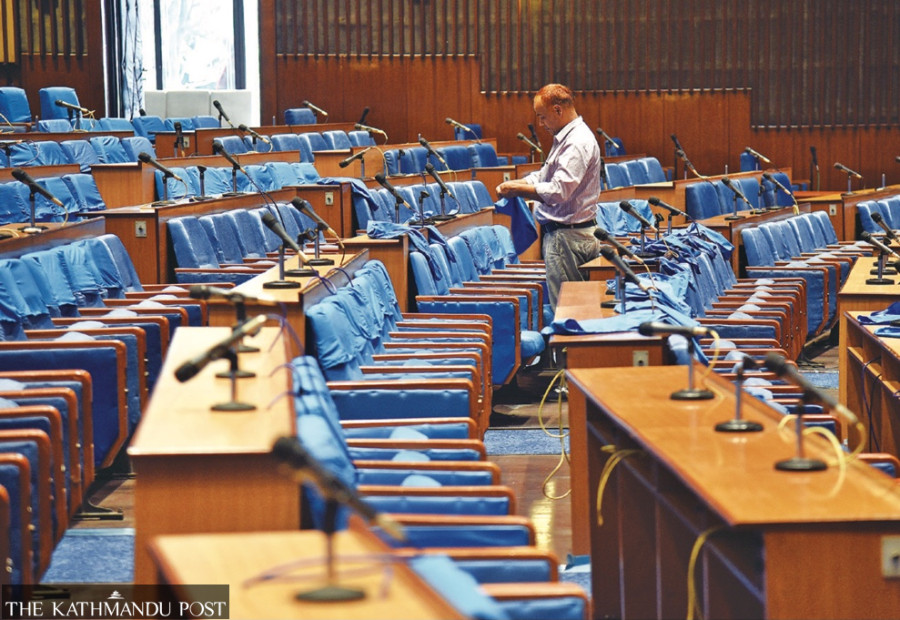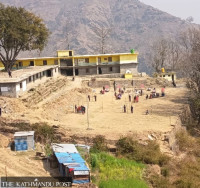National
Congress has opportunity to restore parliamentary supremacy, experts say
Besides over a dozen ordinances of previous government, there are scores of bills awaiting endorsement. Some related to federalism have been pending since 2018.
Binod Ghimire
The last session of the House of Representatives was a total farce.
The session began on March 7 following the Supreme Court’s February 23 order when it reinstated the dissolved lower house. Its five-member Constitutional Bench had ruled that the KP Sharma Oli government’s House dissolution was unconstitutional.
The session lasted 44 days—until April 19—but only nine meetings were held in the period. Its business was limited to endorsing the condolence motions on the demise of incumbent and former lawmakers despite there being dozens of bills pending to be discussed and made into laws. The government did not present the bills for discussion and endorsement to make them into laws.
Another House session is beginning Sunday—once again, courtesy of the Supreme Court when, on July 12, it reinstated the House of Representatives, once again ruling that its May 21 dissolution by the Oli government was unconstitutional.
Observers say that Oli wanted to prove that Parliament was irrelevant and thus he was reluctant to give it any business.
“The parliament became the victim of executive’s highhandedness,” Daman Nath Dhungana, former Speaker and a noted civil society member, told the Post.
But Oli is not the prime minister anymore, after the Supreme Court ordered that Nepali Congress President Sher Bahadur Deuba be appointed to replace him.
“The Congress has both the opportunities and the challenges to restore parliamentary supremacy,” said Dhungana.
The first order of business will be the tabling of 16 ordinances that the previous government had issued in the last one year.
Article 114 (2) of the Constitution of Nepal makes it mandatory for the government to present ordinances in the House during the first meeting of the new session. Similarly, rule 93 (1) of the Regulations of the House of Representatives says the ordinances issued as per Article 114 of the Constitution of Nepal should be presented during the first meeting of the House session. Ordinances become ineffective if they are not endorsed within 60 days from the first meeting of the House.
The Ministry of Law, Justice and Parliamentary Affairs has readied the ordinances for tabling at Sunday's meeting, according to Uday Sapkota, secretary at the ministry.
“However, it is the Business Advisory Committee of parliament that sets the House agenda,” Sapkota told the Post.
Speaker Agni Sapkota has called the committee’s meeting, which has representatives from major parties in Parliament, for Sunday morning.
Among the ordinances is one related to the controversial amendment to the Constitutional Council (Function, Duties, Power and Procedure) Act, 2010. Oli, who as prime minister led the Council, had recommended the appointments of 58 individuals in various constitutional bodies on December 15 last year and May 9. Among them, 52 were appointed.
President Bidya Devi Bhandari appointed them 45 days after they were recommended without the legally-mandated parliamentary hearings because there was no House in place then as Oli had dissolved it.
When the Oli government had presented the ordinance to amend the Constitutional Council (Function, Duties, Power and Procedure) Act-2010, along with others, in the House on March 7, the Nepali Congress, then the main opposition, had obstructed the House session. It claimed that the amendment, whereby the majority of the Council members could hold its meeting and make recommendations for the positions in constitutional bodies, was unconstitutional.
“There is a constitutional and legal obligation to present the ordinances in the first meeting of the House session,” a senior official at the Parliament Secretariat told the Post on the condition of anonymity. “Unless the government withdraws it, we expect the ordinances will be presented.”
In addition to deciding the fate of 16 ordinances, there are 55 different bills in Parliament that need to be endorsed. Some of the bills have been pending in Parliament since the first session in 2018 and many of them are related to the implementation of federalism.
The Federal Civil Service bill and Federal Public Service Commission bill, which need to be made into laws for provincial governments to hire civil servants, are among them. Provincial laws, including the Civil Service Acts, should be in line with federal Acts, according to the constitution. Provincial governments have not been able to draft their own laws without the relevant federal laws in place.
In their absence, the provincial governments have not been able to exercise the authority delegated by the Constitution of Nepal, promulgated more than four years ago.
“The constitution hasn’t been implemented effectively because of the lack of laws related to federalism,” senior advocate Dinesh Tripathi, who specialises in constitutional law, told the Post. “The government’s priority should be facilitating their endorsement without delay.”
There are also amendments to the Citizenship Act, Forest Act, National Human Rights Commission Act, and Media Council and Information Technology Act, among others, pending in parliament for a long time.
The $630-million compact programme under the Millennium Challenge Corporation, an independent foreign aid agency of the US government, too has been pending in Parliament since July 2019 as the House needs to ratify it.
“We are hoping that this session turns out to be active,” said the senior Parliament Secretariat official.
Not just the previous House session but even the sixth session of Parliament, of May 202o, wasn’t very productive. Though dozens of bills were pending, the House endorsed only 10 bills, including three related to the national budget. The only significant achievements of that session were the endorsement of the constitution amendment bill to change the national map of the country—to include Lipulekh, Kalapani and Limpiyadhura area as part of Nepal—and the endorsement of the bill related to the coordination between the federal, provincial and local governments.
“The parliament has long been overshadowed by the government,” Surya Kiran Gurung, former general secretary at the Parliament Secretariat, told the Post. “The Congress government has an opportunity to ensure it functions smoothly.”
Nepali Congress leaders say that the government is committed to proving the relevance of Parliament.
“We are aware how the previous government tried to make Parliament defunct,” Pushpa Bhusal, whip of the Congress, told the Post. “We will put every effort to ensure it functions smoothly.”
Experts in parliamentary affairs say though the Deuba government has a responsibility to give new life to Parliament, how it moves ahead also depends on how Oli and his party behave.
“Oli’s statements have been very acrimonious these days,” said Dhungana, the former Speaker. “How he, as a leader of the opposition, and his party present themselves in Parliament also matters a lot.”




 27.41°C Kathmandu
27.41°C Kathmandu














